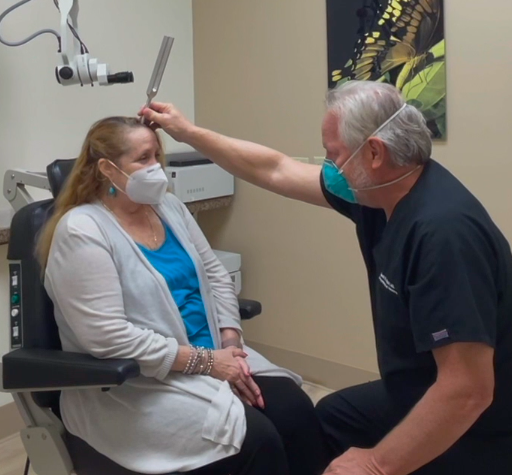Getting to Know your Patient’s Diabetes Care Team
Managing and treating diabetes is a team sport. This is a good example of where collaboration in medicine really comes to play in the day-to-day care of your patient. Understanding the disease and knowing where the patient is in their process of diagnosis, treatment and management is the key to contributing to the team in a meaningful way.

Diabetes and hearing loss are two of America’s most widespread chronic health concerns. More than 34 million people in the US have diabetes, and an estimated 34.5 million have some type of hearing loss. Those are large segments of patients, and it appears there is a lot of overlap between the two groups.
Studies continue to reveal a correlation between diabetes and the increased risk for hearing and balance disorders. A recent study found that hearing loss is twice as common in people with diabetes as it is in those who don’t have the disease. What is even more alarming is what may be happening in the prediabetic segment. Of the 88 million adults in the U.S. who have prediabetes, the rate of hearing loss is 30 percent higher than in those with normal blood glucose. Often we ask patients about their history, and if they have diabetes may be in the list of questions we run through; however as providers evaluating a patient’s hearing and balance, it’s important to dig a little deeper. When is the last time we inquired about prediabetes? And on top of a more robust history, the more we understand about the basics of the disease, the better we will do as we manage their care over their lifetime.
Blocking and tackling – understanding the basics of Type 1 & Type 2 diabetes.
Type 1 Diabetes
So, what is important to know out of the gate about Type 1 diabetes? Type 1 diabetes happens at every age and in individuals of every race, shape, and size. Basically, the key message is that in type 1 diabetes, the body does not produce insulin. The body breaks down the carbohydrates we eat into blood sugar, called blood glucose, and uses for it for energy. Insulin is a hormone that the body needs to get glucose out of the bloodstream and into the cells of the body, where it can do its work. This condition can usually be managed with a lifestyle of proper diet and exercise. Insulin therapy and other lifestyle related treatments and long-term habits can lead to successful management of this condition.
Understanding Type 2
Type 2 diabetes is the most common and instead of not producing insulin, the body doesn’t use insulin properly. Type 2 diabetics can sometimes manage their disease with healthy eating and exercise, others more often, patients require medication or insulin to help manage it.
When managing a patient with diabetes, there are often a lot of players on the field. The patient is the most important one on the team, as they are responsible for new habits and sometimes a new medication to successfully address the issues. As a provider, getting to know the other players, communicating and collaborating on care is really important to the team’s star, as the more support a person has, be easier it is to stay on track.
Let’s get to know the different kinds of health care providers who can be part of the diabetes management team.
These can include the professionals listed below, but keep in mind, this team is broad. Talking with your patient to understand who is involved in their care is key to getting the entire picture of who is in the know, and helping with the overall management of your patient’s health.
- Primary Care Provider: the general practitioner physician or mid-level provider such as a nurse practitioner or physician assistant provides the routine medical care, including physical exams, lab tests and prescriptions for medication.
- Endocrinologist: this physician specializes in diabetes and other diseases of the endocrine system, when things get tough, they call in the big dawgs. This team is the specialist.
- Ophthalmologist or Optometrist: Just as hearing is impacted by this disease, so are the eyes. The medical physician or Doctor of Optometry both can play a part in the diagnosis and treatment of patients and any related eye diseases and disorders.
- Podiatrist: The foot doctor jumps in when circulation to the lower extremities is impaired. The podiatrist is trained to treat feet and lower leg problems.
- Pharmacist: Everyone has a job here; the local pharmacist often is the one who sees the big picture when it comes to patients and their medications. They keep an eye how they interact with each other.
- Dentist: Diabetes impacts our oral care too. The patient’s dentist is an important player, keeping tabs on our patient’s teeth and gums.
- Registered Nurse: Often there is an RN that is overseeing chronic care management and coordinating the patient’s visits to multiple providers. They can really make the difference for our patients and asking if there is someone in the primary care office that provides an extra hand is a good habit to get into when taking this patient’s history.
- Registered Dietitian: Being an expert in nutrition, the registered dietitian an important part of the team. They are often advising our patients about the best foods that help manage blood sugar.
- Certified Diabetes Care and Education Specialist: Certified Diabetes Educators have extensive training and experience working with people with diabetes. They are coach our patients about from manage the things you need to do to take care of your diabetes, in a way that fits with your daily life, routines, environment and family dynamics. To work with an expert in a diabetes education program recognized by the American Diabetes Association, visit diabetes.org/findaprogram or call 1-800-DIABETES (800-342-2383) to find a program in your community.
- Mental Health Professional: This person may be a psychiatrist (MD or DO), psychologist (PhD) or clinical social worker (LCSW or LISW). These professionals can help you deal with the day-to-day challenges of living with diabetes as well as more serious emotional issues. Be sure to work with a mental health professional who understands diabetes and the medicine and insulin you are taking that may affect your blood sugar.
- Fitness Professional: A physical activity specialist may be an exercise physiologist, personal trainer or physical therapist. These professionals can help you find exercises that are safe for you, and ensure you get the most out of your exercise program. Be sure to work with a fitness professional who understands diabetes and the medicine and insulin you are taking that may affect your blood sugar.
- It is important to choose diabetes care team members who can provide the level of support you want and provide help when you need it. The more information you can give when you get help, the easier it is for someone to assist you. Be sure to write down questions and concerns to bring with you to your appointments.
Check out the CDC brochure that talks Ears and Diabetes – and suggests ways to prevent the negative outcomes of hearing and balance impairments. Download a quick reference here! https://www.cdc.gov/diabetes/pdfs/library/Diabetes-Ears-h.pdf








